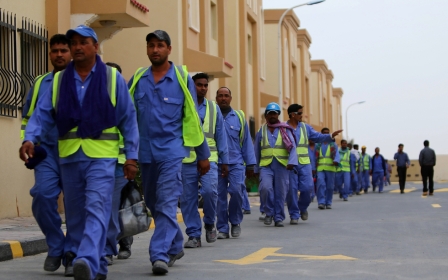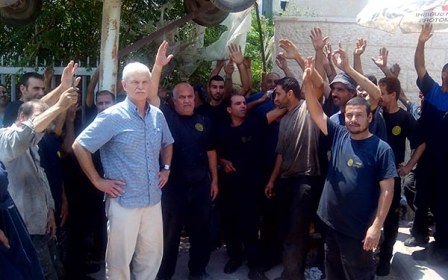West Bank union organiser reinstated after two-year battle

Hatem Abu Ziadeh, a 45-year-old car mechanic from a village near Ramallah, is savouring his victory and preparing to help Palestinian workers throughout the West Bank fight for better conditions after an Israeli court ruled his dismissal two years ago was unlawful.
For 17 years the father of six worked at Zarfaty garage in Mishor Adumim, an industrial zone in the Israeli settlement Ma'ale Adumim. His employer, Israeli Morris Zarfaty, told Middle East Eye that about 80 people worked for his company.
In July 2014, as leader of a workers committee in the Zarfaty garage, Abu Ziadeh helped organise industrial action against his Israeli employers after they refused to recognise a union set up by the garage workers to challenge poor working conditions.
The WAC-MAAN (Workers’ Advice Centre) is one of the first trade unions to operate in a West Bank industrial zone, manufacturing hubs set up in areas occupied and controlled by Israel that are deemed illegal under international law. The union is jointly led by Israelis and Palestinians and represents Palestinians working for Israeli companies in the West Bank.
In July, Abu Ziadeh, a stocky man with a round face and a faint moustache, delivered a letter to his employer Zarfaty announcing a planned strike by the workers in protest at low wages, the lack of proper wage slips, vacation, sickness pay, a pension fund and overtime pay.
A few days after the strike, Abu Ziadeh found that his work permit – which he needs to travel from his home in the town of Birzeit to work in the industrial zone – had been canceled by Israeli authorities. The managers of the garage had told the security services that Abu-Ziadeh had "sabotaged a military vehicle" and was a potential “security risk”.
Both Abu Ziadeh and the union say that the complaint was a lie intended to undermine the workers and their new union.
After months of wrangling, the National Labour Court in Jerusalem finally ruled on Tuesday night that Abu Ziadeh was to be reinstated because his layoff was unfair.
Since an Israeli Supreme Court ruling in 2007, all workers in Israeli settlements, including Palestinians, are entitled to the Israeli minimum wage - but not every company is abiding by the law.
The Histadrut, Israel's trade union federation, does not represent Palestinian workers in settlements. The settlements in the West Bank are usually located in areas under either joint Israeli-Palestinian military and Palestinian civil control or full Israeli control. Therefore Palestinian unions have no authority and no leverage when it comes to Palestinian workers working in Israeli settlements.
Hatem and the other workers from Zarfaty garage were asking for better working conditions, including a minimum wage and getting paid according to skills and experience.
Zarfaty refused to deal with a union in his garage, let alone with a foreign body such as WAC-MAAN.
“It’s really like family to him, he’s been working with his employees for two decades sometimes, they go to each other’s children weddings, so why would you bring someone else to deal with your workers? Why do you need another organisation?” a source close to the case told MEE.
Zarfaty’s lawyer insisted that it creates distrust in the garage and that there could be political interests involved on the union side. Other supporters of Zarfaty say the fact that Israeli labour law now applies in settlements is keeping them from developing their businesses.
“Morris Zarfaty feels that the law is entering his company’s prerogatives, but it’s the law… Maybe you don’t find it nice to have unionised workers in your factory, but it’s the law. It’s the same as income tax, or anything else: whether you like or not, it’s the law,” Assaf Adiv, national director of WAC-MAAN told MEE.
The verdict is important for Hatem, who has been out of a job for two years – although he started driving a shared taxi between Ramallah and Bir Zeit. About 30,000 Palestinians work in settlements. The verdict could make the settlement jobs more attractive in the sense that the Israeli minimum wage is supposedly always more than the basic Palestinian wage.
Additional reporting by Alex MacDonald
Stay informed with MEE's newsletters
Sign up to get the latest alerts, insights and analysis, starting with Turkey Unpacked
Middle East Eye delivers independent and unrivalled coverage and analysis of the Middle East, North Africa and beyond. To learn more about republishing this content and the associated fees, please fill out this form. More about MEE can be found here.




